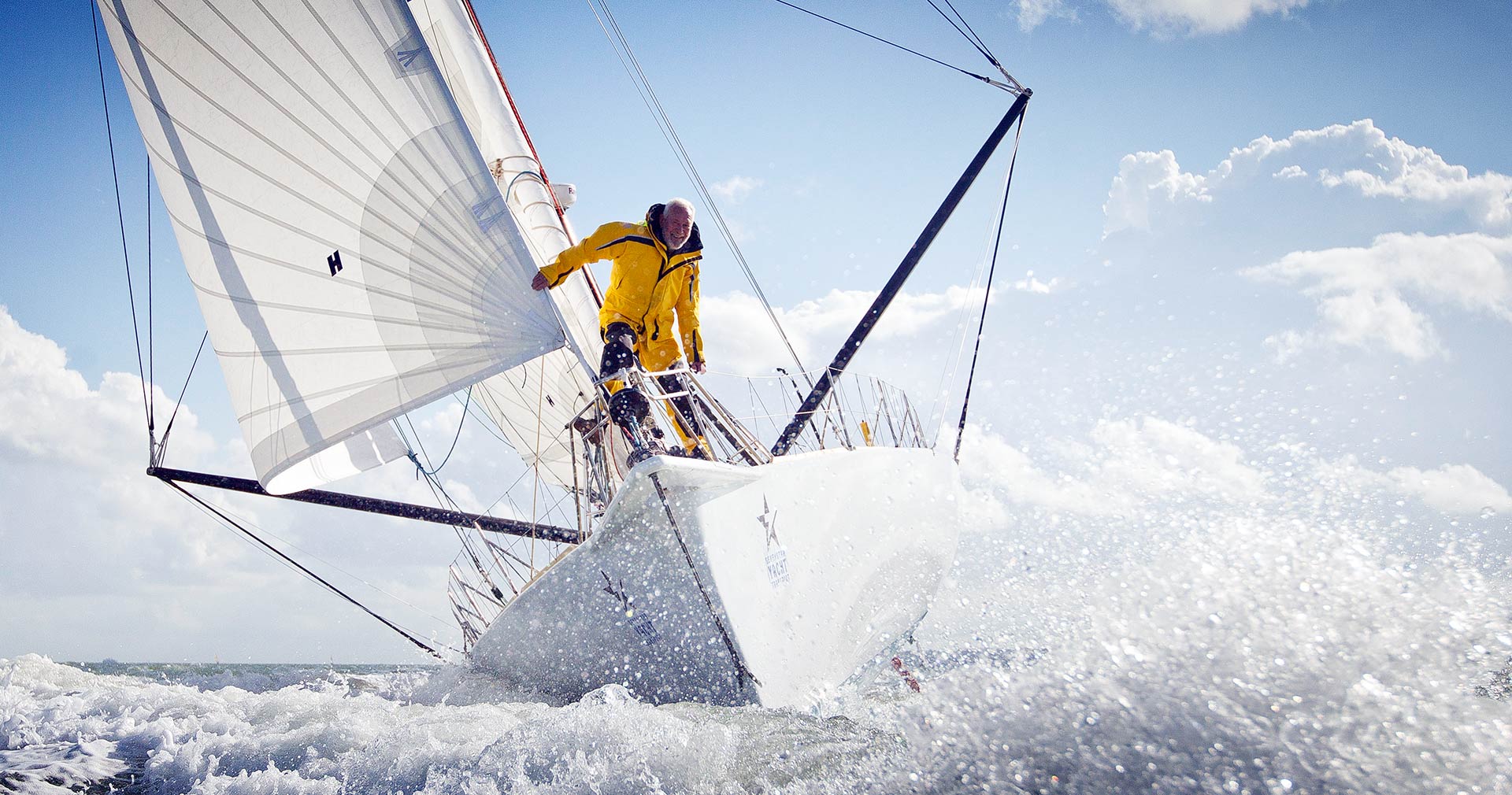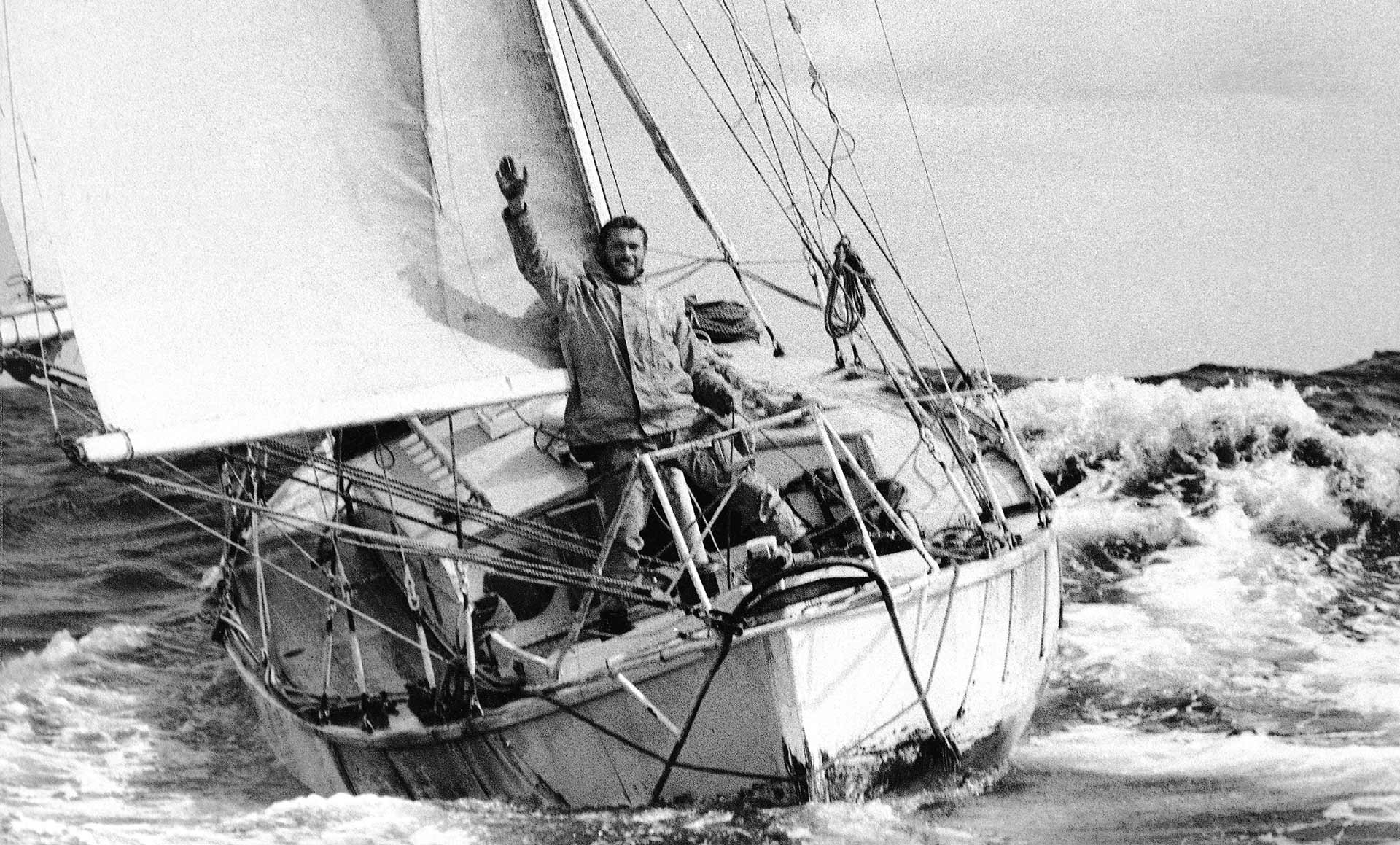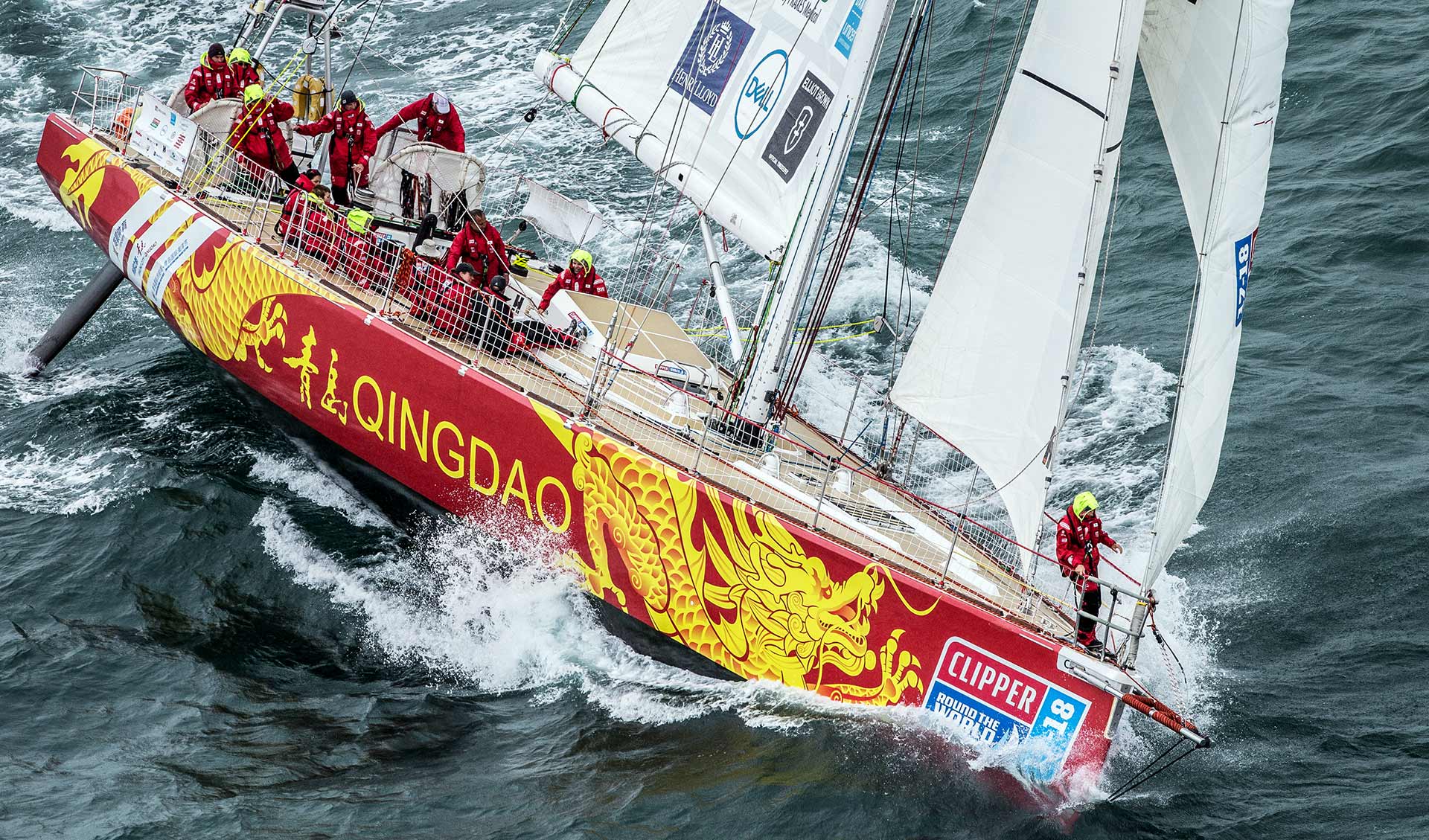I must admit, I was a bit nervous and, fairly untypical for me, hesitant and unsure when I´ve got the chance to talk to Sir Robin Knox-Johnston. Illogical, because he is, as I am, a normal person. But the fact that his book “A world of my own” (read my review here) has its place on the shelf next to Joshua Slocum, Jimmy Cornell or Bernard Moitessier did motivate me in spending an extra round of thinking about what would I ask a living legend like him indeed. I don´t know if I succeeded here.
After receiving his first batch of answers via E-Mail – he was at this time oscillating between UK and Australia – I was puzzled by his style of writing: Very short, very precise and straight to the point. Just like a Morse-message from the past, not wasting a single character. Mostly no more than 5 words, his signature being a simple “RKJ”. I asked if we could have a phone chat for some more details, he agreed. Talking to him was like me standing on a boat passing by him aboard another one – we wasted not a second for small talk or unnecessary fillers. 7 Minutes. After hanging up, I remain impressed.
“I am busy.”
Lars Reisberg | NO FRILLS SAILING.com “Mr. Knox-Johnston, aged 78 now, apparently thriving with energy, full of plans and constantly travelling the world to various places and events: Where does Sir Robin Knox Johnston get his energy from? What drives you and keeps you going on like a 23-year-old lad?”
Sir Robin Knox-Johnston: “If you keep busy and active you keep fit naturally. Having the Clipper Race-business helps me a lot to keep busy.”
NFS.com “What is your position in the Clipper business and what exactly do you do?”
RKJ “Well, I am the chairman. What does the Chairman of Volkswagen do?”

NFS.com “The concept of the Clipper Race appears to me as being the exact opposite of the Golden Globe Race . That´s fast, modern, sleek racing yachts. Speed. High-Tech. What´s would you say is the thrill to take part in this race for the most people from your point of view? How are these people different from the Golden Globe Race revival participants?”
RKJ “I don´t think that there is much of a difference. It is ordinary people doing something extraordinary. Why should a sail around the world be the privilege of professionals only? I think that those who do the Clipper Race are the sort of humans who advance humanity. Because they dare.”
NFS.com “Lately a participant tragically died while en route with the Clipper fleet. I recently interviewed Chinese pro-sailor Guo Chuan (read the article here) who a few weeks later drowned. People get lost frequently: How did you cope with your thoughts on your own possible death during the Race in ´68?”
RKJ “I did not think about it back then and I don’t think about death now. I do think about tomorrow and the next year. You see, we do lose lives at sea. The sea is a dangerous place. Just take a look at the number of fishermen that are lost each year. An average of 20 souls in Britain alone. Look at the tragedy of that just lost Argentine Submarine.”
NFS.com “What would be your top advise for skippers when it comes to safety?”
RKJ “Take nothing for granted.”
NFS.com “Are you still sometimes aboard the Clipper yachts to sail them by yourself? What´s Sir Robin Knox Johnston´s “daily sailing life” like nowadays?”
RKJ “The Clipper boats cannot be sailed single handed. Yes, I would like to participate in the next Route De Rhum, but I do not have a suitable boat. Also, right now I neither have the time to seek out a sponsor. Daily sailing life is also a question of time. You ought to have time and be in the right place. If both is found, I enjoy classic cruising with friends and family.”
“There is no difference between a sailing adventure and, let´s say, a business.”
NFS.com “What is the first thought that comes to your mind when you think of your Golden Globe Race of 1968/69?”
RKJ “There are times in life when opportunities appear. It was for my life in 1967 when I realised that Francis Chichester had one thing left to be done. I felt I was ready for it. I knew my boat, I was a Master Mariner, and I suppose there is an ambition in all of us to achieve something special life. And, despite the challenges – it was a great sail.”
NFS.com “Did you follow Sir Chichesters journey closely back at that time?”
RKJ “Oh yes. Mostly it was through the newspapers but we occasionally tried to get him over the radio, but failed to get a connection.”

NFS.com “You mentioned you have already been a skilled seafarer before your entry to the race. Had there been a special preparation for the single handed sail around the world?”
RKJ “Well, I built my boat by myself and sailed her from India to the UK. I prepared myself and the boat for the trip during this time. The hardest thing – technically spoken – was my trouble with the boat´s self steering. Other than that I do not remember a specific thing hard to get or to organize. I found it hard to find a sponsor …”
NFS.com “… who was it in the end?”
RKJ “Nobody. I was completely on my own. Of course I received help from friends. It was a very busy time and the hardest thing really was finding time to cope with this.”
NFS.com “What´s the difference of Sir Robin Knox-Johnston´s adventure of 1968/69 and the adventure of the modern Clipper Race or the Golden Globe revival?”
RKJ “There is none. Life itself is an adventure. Running a business is an adventure. Sailing is adventure. In any case, it´s a succession of challenges and problems to be faced and solved. There is no difference between, just that the challenges and the problems are different really.”
NFS.com “What was the main reason why the Golden Globe Race is revived – a circumnavigation on such classic boats, thwarting comparable events with all their CFD-optimized carbon racers, satellite and computer-aided weather routing and stuff?”
RKJ “As I am not a part of the organization, I cannot answer your question in this respect. But I personally see it as going to back to real adventure sailing.”
NFS.com “So, have you been a daredevil back in 1968 to take on the challenge? And are the participants in the revival race daredevils in your eyes? What drives these men and women to take on this challenge?”
RKJ “No, I don’t think I was a daredevil then, nor am I now. I would say that I am a curious man. I think the entrants in the revival race are people looking for something challenging. After all, we tend to do the easy things in life. But where is the real satisfaction? I think it is when we achieve something really difficult that we can feel satisfied – and perhaps a little proud of.”

NFS.com “I´ve done some interviews with pro-sailors on their experiences on single hand races and I found it particularly interesting to talk about their “sleep management”. How did you manage to catch enough sleep and getting the resting time you needed during your Golden Globe Race?”
RKJ “I generally slept when I needed to, when my body told me to get some rest. When during those periods the wind changed, it also changed the motion of the boat. Even if these changes occurred subtly, that would waken me. And it still does by the way. I am in favour of getting the sleep one needs as you deal with problems better if you are not overtired.”
NFS.com “So that´s a more natural approach then?”
RKJ “Of course. There hadn´t been such things as AIS or sleep management. We slept when we could.”
NFS.com “What do you think of modern “sleep management” then?”
RKJ “I think everyone should do what he thinks is best. It wouldn´t be my choice and I tend to think that people try to over-manage things. But again, it´s their choice.”
“The Ocean is a dangerous place.”
NFS.com “I am personally very much thrilled by the story of Donald Crowhurst. A new movie is hitting the cinemas right now: Have you seen the film already?”
RKJ “Yes I have seen the film. I thought it was fantastic as it avoided the temptation to overdramatise the story. Well, of course, the story is dramatic enough anyway.”
NFS.com “What comes to your mind when you hear the name of Donald Crowhurst?”
RKJ “Sadness. He put himself under huge pressures. And they overwhelmed him. You see, I never met him in person and even had not heard of him until I spoke with a journalist off New Zealand well into the race. Afterwards I met his wife Clare once when the documentary “Deep Water” was made and I occasionally hear from his son Simon.”
NFS.com “What´s Crowhurst´s legacy from your point of view? What can sailors learn from his life and death?”
RKJ “I think that there is not very much to learn. Things have changed in 50 years. For example, we don’t do races without a proper qualification sail and we have live-tracking now. So I think a Crowhurst-type of hiding is not possible.”
“The pleasure of classic cruising.”
NFS.com “Are there any future projects or ideas you want to talk about?”
RKJ “Get some more cruising.”
NFS.com “That´s ordinary cruising with sunbathing, a drink or two and having friends and family aboard?”
RKJ “Exactly. It´s hard – again – to find the time, but I enjoy sailing that way very much.”
NFS.com “You are among the most influential sailors. Your book is a set book for all how love the seas an love sailing. Is there anything you´d like to say to young people to ignite their passion for the seas?”
RKJ “The sea gives us freedom. We make the decisions that affect our lives in accordance with the laws of nature – not some bureaucratic jumble of conflicting risk adverse rules we have on land. And indeed in commercial yachts. I would say to young people: Get out on a boat! Feel the satisfaction of propelling yourself by wind alone, and making a voyage to some attractive destination.”
Thanks so much, Sir Robin Knox-Johnston for the pleasure of talking to you. All the best for the future!
Pictures with kind permission by PPL Media and and Clipper Race
You may also like to read these articles:
What makes a good skipper? Part 1 and Part 2
The ideal yacht for a circumnavigation
Book review of “A voyage for Madmen” on the Golden Globe Race of 1968/69
